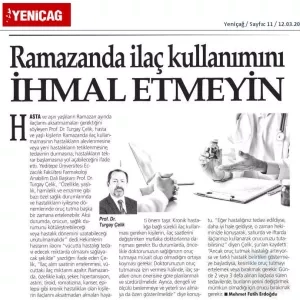Expert Warns: “Do Not Neglect Medication Use During Ramadan!”

A healthy adult can withstand fasting for a certain period. However, experts warn that patients and the elderly, due to disorders or deficiencies in their bodies, might not withstand fasting if they neglect their medication, which could worsen their conditions or deficiencies.
Prof. Dr. Turgay Çelik, Head of the Department of Pharmacology at the Faculty of Pharmacy, Yeditepe University, provided information on the correct use of medications during Ramadan and cautioned against neglecting medication intake.
Çelik highlighted that not taking medications during Ramadan could exacerbate existing conditions or, trigger new ones, halt treatment, or cause a recurrence of illnesses. Turgay Çelik stated, "Especially in certain special health situations like old age, pregnancy, and breastfeeding, as well as during recovery periods of illnesses, fasting can be postponed to another time. Otherwise, it should not be forgotten that fasting could worsen health conditions or prolong illness periods."
“Taking Medication On Time Could Be Crucial”
Turgay Çelik explained that physicians prescribe medications to ensure that they are present in the body in amounts sufficient to treat the illness. He continued:
"Postponing medication times can reduce the drug concentration in the body. Individuals with chronic diseases such as heart disease, diabetes, hypertension, asthma, thyroid disorders, rheumatism, cancer, and epilepsy must take their medications regularly during Ramadan.
Those who need to take medication continuously for a chronic illness must consult their doctors before changing their medication times. As your trusted guide, your doctor needs to determine whether your health condition suits fasting. If your doctor permits fasting, medication times should be planned and continued according to their suggestions. Balanced nutrition and adequate fluid intake should also be carefully maintained."
Consult Your Doctor If You Insist on Fasting
"If your condition has been treated or improved, you may fast by discussing with your physician and taking your medications at Suhoor and Iftar," Turgay Çelik added:
"However, if fasting aggravates your illness or triggers different symptoms, fasting should definitely be postponed or abandoned. For treatments involving medications taken 2 or 3 times a day, it's necessary to stop fasting, as it's not possible to rearrange these timings. Medications must be taken at specific times and intervals. If medications are to be taken during the day or after experiencing discomfort, then fasting should definitely be postponed or abandoned. Regardless, if there's a desire to fast, one must consult with a physician to review the health condition and medication dosage before starting the fast."
“Fasting Can Harm Baby Development”
Prof. Dr. Turgay Çelik also warned about the implications of fasting for pregnant and breastfeeding women, stating, "If you are pregnant or breastfeeding, you should not fast. Fasting can be postponed until after childbirth or the breastfeeding period. The mother must consume nutritionally rich foods and drink water for her and her child's health. Fasting during pregnancy is considered to pose serious health risks to baby development. Fasting must be postponed during these periods for the health and development of both mother and baby." For those who still choose to fast, Turgay Çelik continued:"Under medical supervision, consuming nutritionally rich food and sufficient beverages is crucial between sunset and dawn. Especially during fasting, excessive physical activities should be avoided. If symptoms such as reduced fetal movements, dizziness, fatigue, nausea, or vomiting are observed during fasting, the fast should be broken immediately and medical support sought. Meanwhile, maintaining good nutritional habits during pregnancy and seeking help from specialist physicians if necessary is important."
Seek Medical Advice If You Experience These While Fasting
Prof. Dr. Turgay Çelik noted that while discomfort due to hunger might be expected while fasting, certain conditions could indicate illness and require medical consultation:
- Persistent fatigue and dizziness indicate low blood pressure.
- Nausea, dizziness, and concentration problems could be due to dehydration or insufficient fluid intake.
- The risk and symptoms of kidney stones may increase due to low fluid intake during Ramadan.
- Symptoms like constipation, poor digestion, and acid reflux are common while fasting. Healthy and proper nutrition is necessary to reduce their frequency.
- Many people report headaches and migraines while fasting. If these symptoms persist and worsen, seek medical advice.
- It's necessary to avoid excessive sports and physical activity while fasting. If exercise is needed, engaging in light sports at the end of the day is advised.
